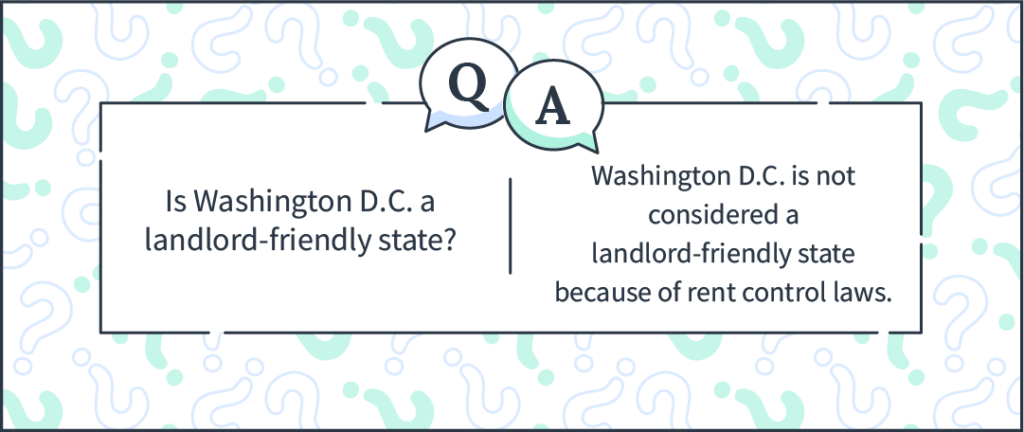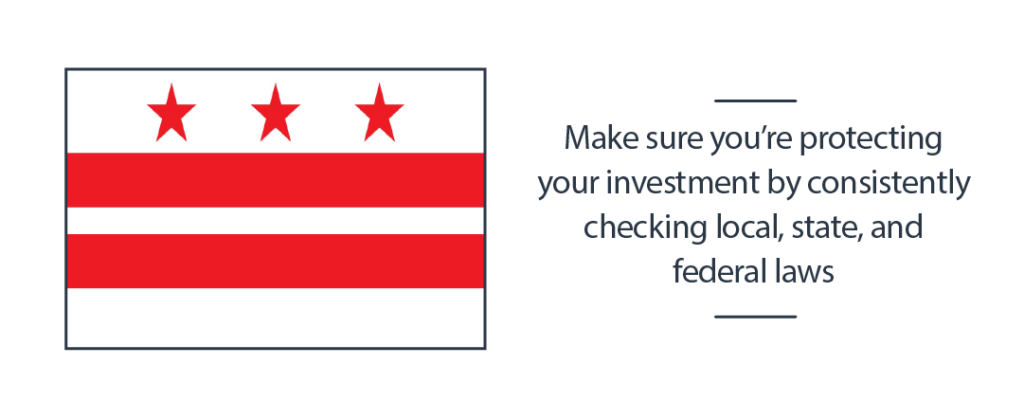As the nation’s capital, Washington, D.C. is a great place to consider whether you are a property investor looking for your next rental unit or a renter looking to relocate. With a rich history, thriving job market, and top-of-the-line education, D.C. provides many incentives for property investors – read below for guidance on Washington, D.C. landlord-tenant law.

Laws that impact the rental market, landlords, and tenants are constantly being decided in states. Make sure you know what’s on your ballot – find Washington D.C. voting information.
Marketing. Applications. Leases. Payments.
Washington D.C. Tenants’ Rights and Landlord Responsibilities
- 45 days to return the security deposit
- Yearly limit to increasing rent
- A 48-hour notice is required before entering the property
- Required to make repairs within a reasonable time frame

When it comes to Washington, D.C. rental laws, there are a few specifics landlords need to know:
- Security Deposit – Washington D.C. limits the amount a landlord may charge for the security deposit to the equivalent of one month’s rent. Landlords must return the deposit within 45 days of the tenant moving out.
- Raising Rent – Landlords in Washington D.C. may not increase rent more than 10% of the CPI-W percentage, and they may only make increases once a year.
- Notice of Entry – Washington D.C. requires a 48-hour notice from the landlord before entering the rental property.
- Repairs – It is the landlord’s responsibility to keep the rental in safe and healthy living conditions. Landlords must make repairs within a reasonable time frame after being notified by the tenant. If they fail to do so, the tenant may withhold rent.
- Rental Applications – Landlords may not consider arrests not resulting in conviction. They must make an offer to rent before considering a pending accusation or conviction from the last 7 years, and only for a listed offense. To withdraw an offer based on a criminal record, a landlord must provide in writing a “substantial, legitimate, nondiscriminatory interest,” considering several factors. Certain housing providers are excluded, and enforcement is available through the Office of Human Rights.
Washington D.C. Rental Laws and Tenant Responsibilities
- A tenant may not withhold rent for any reason outside of the self-help repair statute
- A tenant has 10 days to claim abandoned property
- A tenant has 5 days to pay rent
- Tenants are responsible for maintaining the residence

- Overdue Rent – If a tenant fails to pay rent on time, the landlord is not required to give them any notice or time to cure their violation. If the tenant fails to pay, the landlord may file for eviction immediately.
- Terminating a Lease – If a tenant needs to terminate a month-to-month lease, they must give the landlord a 30-day notice.
- Tenant Responsibilities – Tenants are required to keep the property clean and not disturb neighbors. Landlords may request an inspection of the unit if they believe the tenant is not keeping the property clean and habitable.
- Abandoned Property – If a tenant moves out and leaves personal property, the landlord must notify the tenant and store the property for seven days if the value is less than $250 or 45 days if the value is more than $250. After the seven-day period, if the ex-tenant has not claimed it, the landlord may sell it or throw it away.
Washington D.C. Landlord-Tenant Law FAQ
Below are brief answers for some of the most commonly-asked questions when it comes to landlord-tenant laws in Washington D.C.:

Can You Withhold Rent in Washington, D.C.?
Renters are able to withhold rent if their landlord fails to make repairs.
How Long Does it Take to Evict a Tenant in Washington, D.C.?
Evicting a tenant in Washington, D.C. can take anywhere from two to eight months, depending on the reason for eviction.
Is Washington, D.C. a Landlord-Friendly State?
Washington, D.C. is not considered a landlord-friendly state because of rent control laws and more tenant-friendly laws compared to elsewhere in the U.S.
What is the Eviction Process in Washington, D.C.?
There are seven reasons a landlord may file for eviction in DC. The seven reasons include violation of the lease agreement, demolition of the unit, renovation of the unit, discontinuance of use, owner’s personal use, sale of the unit, and illegal activity. Depending on the violation, the landlord must give the tenant notice and anywhere from 30 to 180 days to cure their violation.
If the tenant fails to cure or quit, then the landlord may file a complaint with the court, which costs $15. After the complaint is filed, it will be served to the tenant at least seven days before the hearing.
If the court rules in favor of the landlord, then a writ of restitution will be issued within two days. The tenant will have three days to move out.
How Much Notice Does a Landlord Have to Give a Tenant to Move Out in Washington, D.C.?
Landlords must give a 30-day notice before asking a tenant to vacate the property.
Due Diligence and Washington D.C. Rental Laws

TurboTenant has utilized many municipal sources along with official state statutes in order to compile this information to the best of our ability. However, local laws are always in flux, and landlords and tenants alike should be sure to do their due diligence and consult legal help when it’s needed. We hope the following list can serve as a valuable resource and allow you to succeed as a landlord or tenant in Washington D.C. Be sure to take proper precautions when it comes to finding the top candidates for your unit by utilizing our online rental application and tenant screening services.
Disclaimer: TurboTenant, Inc does not provide legal advice. This material has been prepared for informational purposes only. All users are advised to check all applicable local, state, and federal laws and consult legal counsel should questions arise.

